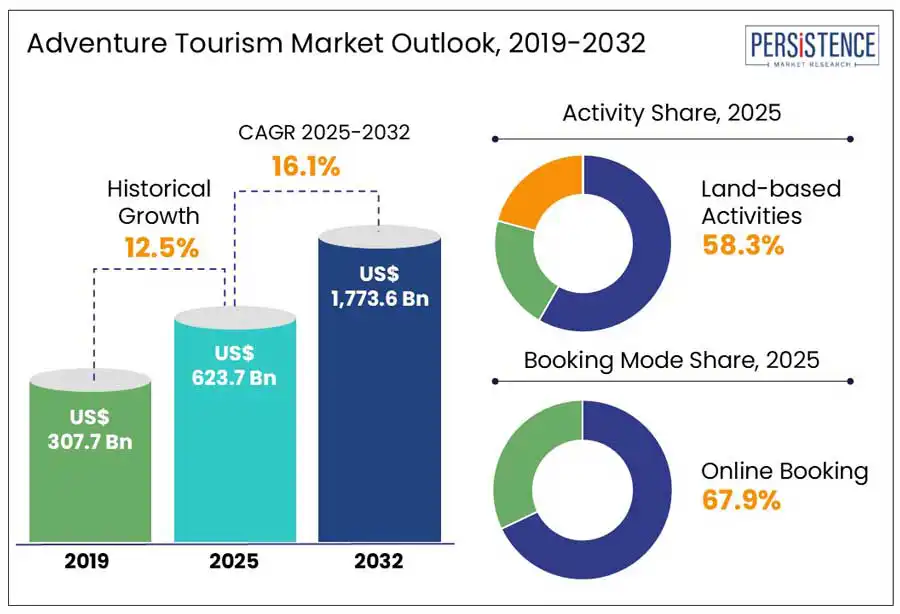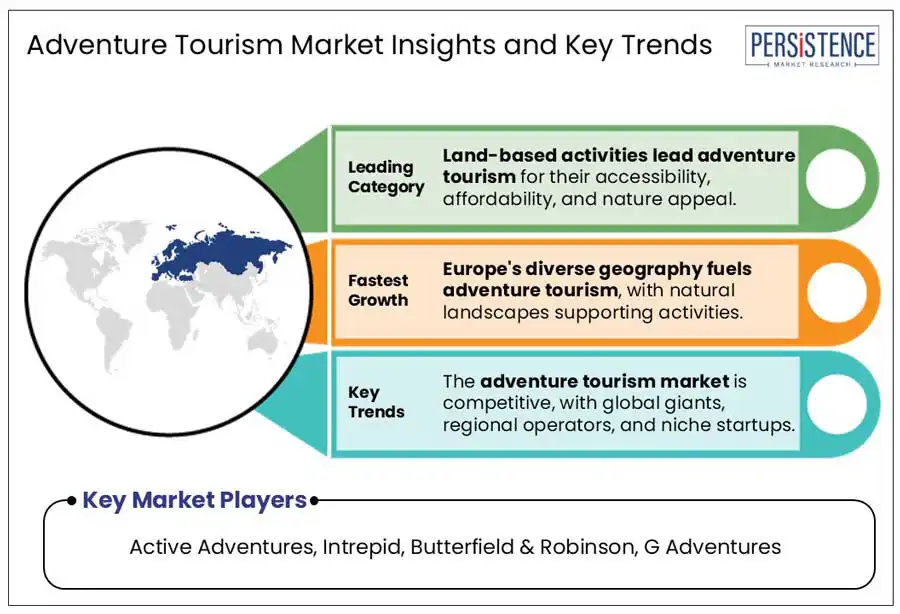ID: PMRREP32549| 175 Pages | 6 May 2025 | Format: PDF, Excel, PPT* | Consumer Goods

The global adventure tourism market size is expected to grow from US$ 623.7 billion in 2025 to US$ 1,773.6 billion with a projected CAGR of 16.1% by 2032 According to the Persistence Market Research report, due to the rising interest in experiential travel, increasing disposable incomes, and greater awareness of health and wellness fuel the need. Activities such as trekking, rafting, and paragliding appeal to thrill-seekers across all age groups, supported by improved infrastructure, digital booking platforms, and social media influence. Peru's renowned Inca Trail leading to Machu Picchu exemplifies the popularity of land-based adventure tourism. In 2023, Machu Picchu welcomed over 950,000 tourists, reflecting a steady recovery post-pandemic.

Key Industry Highlights
|
Global Market Attribute |
Key Insights |
|
Adventure Tourism Market Size (2025E) |
US$ 623.7 Bn |
|
Market Value Forecast (2032F) |
US$ 1,773.6 Bn |
|
Projected Growth (CAGR 2025 to 2032) |
16.1% |
|
Historical Market Growth (CAGR 2019 to 2024) |
15.4% |
The rising demand for experiential travel is a key driver of the adventure tourism market, as modern travelers, especially millennials and Gen Z seek immersive, authentic experiences over traditional vacations. Activities like trekking, scuba diving, and wildlife safaris offer personal growth, adrenaline, and a deep connection with nature and local cultures.
In 2024, Patagonia (Chile & Argentina) saw a surge in visitors, with Torres del Paine National Park attracting record numbers for trekking and glacier expeditions. Social media influence and eco-conscious branding fueled interest in off-the-grid adventures and sustainable lodges, reinforcing the shift toward meaningful, nature-driven travel experiences in the adventure tourism industry.
Seasonal dependence and weather uncertainty significantly challenge the adventure tourism market, as many activities rely on specific climate conditions. Winter sports such as skiing need sufficient snowfall, while trekking and scuba diving require stable weather. Unpredictable events such as storms, heatwaves, and heavy rains can lead to cancellations, safety concerns, and reduced tourist turnout.
In 2024, the European Alps faced one of the warmest winters on record, causing low snowfall and forcing ski resorts in France, Switzerland, and Austria to close slopes or use costly artificial snow. This unpredictability discouraged early bookings, shortened seasons, and reduced revenues, highlighting the industry's vulnerability to climate variability.
Technological advancements are transforming the adventure tourism market by enhancing safety and boosting traveler confidence. Innovations such as GPS tracking, drone surveillance, satellite communication, and AI-powered risk assessment tools enable real-time monitoring, better planning, and swift emergency response.
Wearable health devices, such as those introduced in 2025 by trekking companies in Japan for Mount Fuji climbers, monitor vital signs and alert guides to signs of altitude sickness or fatigue. Connected via satellite, these tools ensure rapid intervention. As perceived risks decline, participation from beginners and solo travelers rises, expanding market potential and making adventure tourism more accessible and appealing to a wider audience.
Land-based activities dominate the adventure tourism market due to their accessibility, affordability, and strong appeal to nature enthusiasts. Popular pursuits like hiking, trekking, mountain biking, and wildlife safaris attract a wide range of travelers, including families, solo explorers, and eco-conscious tourists. These activities often require minimal training, making them inclusive and easy to adopt. Government-backed eco-tourism initiatives, increased visits to national parks, and a growing preference for sustainable travel further drive growth.
Nepal's trekking industry exemplifies this trend, with over 170,000 trekkers visiting in 2023. Iconic routes like the Everest Base Camp and Annapurna Circuit offer scenic beauty and cultural experiences, significantly benefiting local communities. Social media’s influence and demand for immersive, off-the-grid experiences continue to strengthen the dominance of land-based adventures globally.
Online Travel Agencies (OTAs) dominate the adventure tourism market due to their unmatched convenience, wide-ranging offerings, and competitive pricing. The digitalization of travel has made booking adventure experiences easier than ever, with platforms such as Expedia, Booking.com, Airbnb Experiences, and Viator offering instant access to diverse packages. With rising smartphone usage and improved internet connectivity, travelers can now effortlessly compare options, read reviews, and secure bookings from anywhere. OTAs also provide user-friendly interfaces, personalized recommendations, and flexible options like last-minute deals and custom itineraries, making them a preferred choice.
Social media further fuels this trend, as shared travel stories and photos inspire others to seek similar experiences. Airbnb’s “Experiences” segment, which connects users with local hosts for unique activities, recorded a 13.9% increase in “nights and experiences” booked, reaching 448 million in 2023. This growth highlights OTAs' ability to meet evolving traveler demands and reinforce their leadership in the adventure tourism space.

North America’s dominance in the adventure tourism market is driven by a robust post-pandemic recovery, high service standards, and effective capacity management. In 2023, tour operators in the region served an average of 10,163 guests—double the 2022 figure-indicating strong demand. A low guide-to-guest ratio of 1:5, the smallest globally, reflects a focus on personalized, high-quality experiences. The region also boasts a strong trip fill rate of 71%, surpassing the global average of 65%, and a high direct booking rate of 75% compared to the global 62%, showing travelers’ preference for direct engagement.
North America’s market success is further supported by user-friendly booking systems, strategic marketing, and skilled staff. Its advanced tourism infrastructure, varied adventure landscapes, and supportive business environment enable operators to offer premium, memorable experiences solidifying the region’s leadership in the global adventure tourism market.
Europe’s diverse geography offers immense potential for the adventure tourism market, with natural landscapes supporting activities such as hiking in the Alps, skiing in the Pyrenees, surfing in Portugal, and kayaking in Norway’s fjords. This variety attracts thrill-seekers and nature lovers alike. In 2024, Portugal’s Algarve saw a surge in surfing, coastal hiking, and rock climbing, while Norway’s Lofoten Islands drew crowds for kayaking, glacier hiking, and mountain biking. Tour operators noted increased demand for multi-activity packages, enabling travelers to experience multiple adventures in one trip. Europe’s accessibility, infrastructure, and cultural richness further enhance its appeal as a year-round adventure destination.
Social media platforms such as Instagram, YouTube, and TikTok have significantly influenced the adventure tourism market in the Asia Pacific region. Travel influencers and content creators showcase thrilling experiences such as trekking in Nepal, scuba diving in Indonesia, and skydiving in Australia, inspiring millions of followers to pursue similar adventures. The aspirational value of visually stunning and viral content motivates tourists to explore offbeat and adrenaline-filled destinations. User-generated content, real-time reviews, and travel blogs enhance the visibility and credibility of these locations.
Moreover, tourism boards and adventure operators actively leverage digital marketing and social media trends to attract travelers, promoting unique experiences and boosting tourism demand. This dynamic engagement between creators, audiences, and tourism stakeholders continues to shape travel decisions, positioning social media as a key driver of adventure tourism growth across Asia Pacific.
The competitive landscape of the global adventure tourism market is characterized by a mix of global travel giants, regional tour operators, and niche experience-based startups. Key players offer curated adventure packages across continents, often focusing on sustainability and cultural immersion. Meanwhile, local operators capitalize on region-specific expertise and personalized services. Technological integration, eco-tourism trends, and strategic partnerships with hospitality and transportation providers are shaping competition. Companies are increasingly leveraging digital platforms, influencer marketing, and immersive virtual experiences to attract younger, experience-driven travelers, intensifying rivalry and innovation within the rapidly evolving market.
The global Adventure Tourism market is projected to value at 623.7 Bn in 2025.
The Adventure Tourism market is driven by Growing enthusiasm among Gen Z and millennials is boosting adventure tourism.
The Adventure Tourism market is poised to witness a CAGR of 16.1% from 2025 to 2032 or between 2025 and 2032.
Traction towards Immersive Experiences Fueling the Rise of Adventure Tourism among travelers is the key market opportunities.
Major players in the Adventure Tourism market include Active Adventures, Intrepid, Butterfield & Robinson, G Adventures, and others.
|
Report Attribute |
Details |
|
Historical Data/Actuals |
2019 - 2024 |
|
Forecast Period |
2025 - 2032 |
|
Market Analysis Units |
Value: US$ Bn |
|
Geographical Coverage |
|
|
Segmental Coverage |
|
|
Competitive Analysis |
|
|
Report Highlights |
|
|
Customization and Pricing |
Available upon request |
By Type
By Activity
By Traveler Type
By Booking Mode
By Region
Delivery Timelines
For more information on this report and its delivery timelines please get in touch with our sales team.
About Author